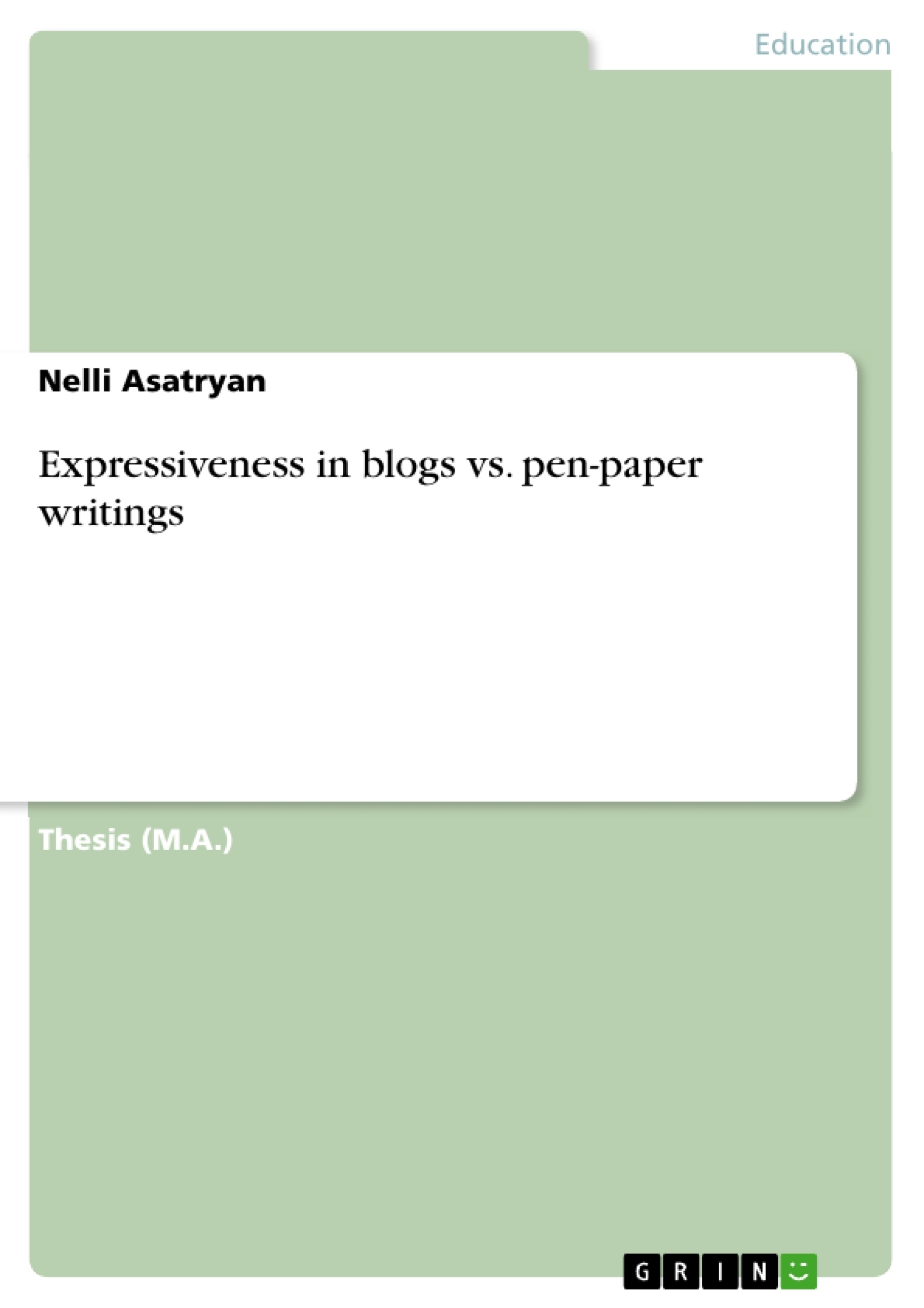The study explored the expressiveness in two types of writing modes: the pen-
paper and the blog entries. It also studied the students’ attitude towards implementing these tools. This paper was conducted through a mixed method approach. Eleven participants of the age range 15-16, were from one of the groups in the Experimental English Courses at the American University of Armenia. Data collection was from the students’ reflective writings and two interviews. The reflective writings were analysed quantitatively through Excel program to find the percentages and create the visuals. The qualitative data from both semi-structured interviews was analysed descriptively. The study concludes that blog helped students express themselves more freely than in writing in terms of the three criteria of expression chosen for this study.
Table of Contents
- Chapter One: Introduction
- 1.1. Purpose of the Study
- 1.2. Research Questions
- 1.3. The Structure of the Thesis
- Chapter Two: Literature Review
- 2.1. Writing
- 2.1.1. What is Writing?
- 2.1.2. Types of Writing
- 2.1.3. Expressiveness in Writing
- 2.1.4. Pedagogical Perspective Benefits of Expressive Writing
- 2.1.5. Challenges of Expressive Writing
- 2.2. Blogging
- 2.2.1. What is Blog
- 2.2.2. Who and Why should Blog
- 2.2.3. Features of Blogging
- 2.2.4. Blogging as a teaching tool in Education
- 2.3. Blog in ESL/EFL
- 2.3.1. Benefits of Blog
- 2.3.2. Challenges of Blogging
- Chapter Three: Methodology
- Chapter 3.1: Research Question Restatement
- Chapter 3.2: Setting
- Chapter 3.3: Participants
- Chapter 3.4: Instruments
- Chapter 3.5: Research Design
- Chapter 3.6: Treatment
- Chapter 3.7: Data Collection
- Chapter 3.8: Data Analysis
- Chapter Four: Results
- Chapter 4.1: Analysis of the Findings of the first Research Question
- Chapter 4.2: Analysis of the Findings of the first Research Question
- Chapter Five: Discussion and Conclusion
- Chapter 5.1: Discussions of the Results
- Chapter 5.2: Limitations and Delimitations
- Chapter 5.2.1: Limitations
- Chapter 5.2.2: Delimitations
- Chapter 5.3: Pedagogical Implications
- Chapter 5.4: Recommendations for Further Research
- Chapter 5.5: Conclusion
- The nature and characteristics of written expression
- The impact of different writing mediums on expressiveness
- The pedagogical implications of using blogging for language learning
- The challenges and benefits of both traditional writing and blogging for language development
- Chapter One: Introduction: This chapter provides a brief overview of the research topic, stating the purpose of the study and outlining the research questions that will be addressed. The structure of the thesis is also presented.
- Chapter Two: Literature Review: This chapter explores the existing literature on writing, blogging, and their relevance to language learning. It delves into the nature of writing, the different types of writing, the concept of expressiveness in writing, and the pedagogical benefits and challenges of both traditional and online writing.
- Chapter Three: Methodology: This chapter explains the research design and methodology used to investigate the research questions. It details the participants, instruments, data collection methods, and data analysis procedures employed in the study.
- Chapter Four: Results: This chapter presents the findings of the research, analyzing the data collected and comparing the levels of expressiveness in pen-paper writings and blog entries.
- Chapter Five: Discussion and Conclusion: This chapter discusses the implications of the research findings, highlighting the pedagogical significance of the results and considering limitations of the study. It also provides recommendations for future research and offers a concluding statement summarizing the main contributions of the thesis.
Objectives and Key Themes
This thesis aims to investigate the differences in expressiveness between traditional pen-paper writing and blogging. It explores how the use of different writing mediums affects the levels of expression in written work. The key themes explored in this thesis include:Chapter Summaries
Keywords
This thesis explores key concepts and terms related to written expression, including expressiveness in writing, writing mediums (pen-paper vs. blog), pedagogical implications of blogging for language learning, and the benefits and challenges of both traditional writing and blogging for language development.Frequently Asked Questions
What is the difference in expressiveness between blogs and pen-paper writing?
The study found that blogging helps students express themselves more freely compared to traditional pen-paper writing across several criteria of expression.
What are the pedagogical benefits of expressive writing?
Expressive writing allows learners to reflect on their thoughts and feelings, which can enhance language acquisition and personal development in ESL/EFL contexts.
What challenges do students face with blogging in education?
Challenges include technical issues, concerns about online privacy, and the pressure of writing for a public or semi-public audience.
How was the data for this study collected?
Data was collected through a mixed-method approach, including students' reflective writings (analyzed quantitatively) and semi-structured interviews (analyzed qualitatively).
Who participated in the study on blogging expressiveness?
The participants were eleven students aged 15-16 from Experimental English Courses at the American University of Armenia.
- Quote paper
- Nelli Asatryan (Author), 2014, Expressiveness in blogs vs. pen-paper writings, Munich, GRIN Verlag, https://www.grin.com/document/278088



